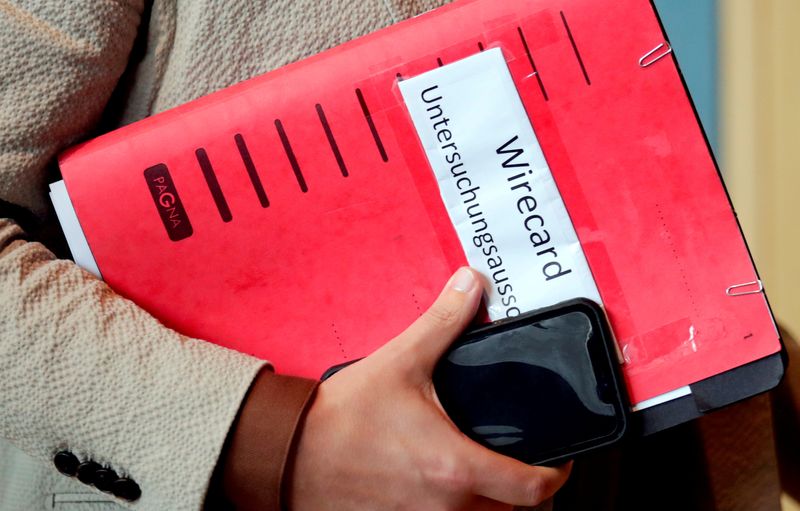By John O'Donnell and Tom Sims
FRANKFURT (Reuters) - In February 2019, after a steep drop in Wirecard's share price, German authorities launched criminal probes into short-sellers and journalists who had accused the company of fraud, and banned investors from betting against the company.
Documents seen by Reuters show for the first time that the only independent information - beyond Wirecard's representations - received by Munich prosecutors who launched the criminal probes was a third-hand account of events from a convicted money launderer, Daniel James Harris.
The rationale that led to the decisions of prosecutors and regulators to launch the criminal probes and short-selling ban, and whether they were overzealous in supporting Wirecard, are central issues being investigated by a parliamentary inquiry into the company's collapse in Germany's biggest post-war fraud scandal.
The criminal probes and short-selling ban were launched by authorities after Wirecard complained it was being targeted by unidentified speculators who it said were in cahoots with two Financial Times journalists and had advance knowledge of a negative report that it said baselessly alleged accounting manipulations.
Some Wirecard executives were in fact engaged in a sophisticated global fraud at that time, the German government, prosecutors and regulators said last year after the payment company filed for insolvency, owing creditors almost $4 billion.
The trove seen by Reuters includes thousands of pages of emails, chat messages and memos provided by German authorities to the parliamentary inquiry, which reaches a climax this week with testimony from Chancellor Angela Merkel on Friday.
The witness testimony from Harris was provided by Wirecard, with a lawyer for the company delivering the two-page written statement in person to a prosecutor on Feb. 14, 2019, according to the documents.
In the statement, Harris identified himself as an equities trader in Essex, southern England, and said he met his broker, whom he didn't identify, on Jan. 30, 2019, the day Wirecard's share price plunged up to 22%.
The broker said he had been told that investors were trading in anticipation of a negative FT report about the company, which was published in the afternoon of that day, according to the statement seen by Reuters.
"He told me he had spoken with a friend of his," Harris said. "My broker said that this friend had told him that an article was about to be published about Wirecard."
In his statement, Harris said he didn't act on the information. However Wirecard argued that market talk of a negative article ahead of publication was proof that investors were trading on inside information, and perhaps in collusion with journalists. At the time, the FT denied this, characterising Wirecard's claims as a "smokescreen".
Reuters was unable to contact Harris or his lawyers for comment.
Harris was sentenced to a two-year jail term in February 2017 for money laundering for drug dealers who ran a moped delivery service in London and Essex, according to Britain's National Crime Agency.
A spokeswoman for the Munich state prosecutors said Harris' statement corroborated Wirecard's claims that it was unfairly targeted by speculators.
"The statement under oath was used by legal representatives of Wirecard to substantiate the legal complaint," she added.
In February this year, the state prosecutor told the parliamentary inquiry that he did not speak to Harris, without elaborating.
Munich prosecutors dropped the inquiry into the journalists last year, concluding there was no evidence of any collusion with investors, while no action has yet been taken against the several short-sellers investigated.
'VERY CONCRETE INFORMATION'
The documents seen by Reuters include correspondence by executives and officials from Wirecard, prosecutors and financial regulator BaFin provided to lawmakers.
The prosecutors' office emailed Harris' statement to BaFin on Feb. 15, 2019, a Friday, the documents show, and the following Monday BaFin announced the first short-selling ban on a single stock in German history.
BaFin's ban was a watershed in the saga, according to lawmakers who have said it implicitly vouched for the company's credibility, while halting investors that doubted it.
A BaFin spokeswoman said the Harris witness statement played "no role" in the short-sale ban, but that it did fit into its examination of market manipulation.
Yet Sebastian Kimmer, a member of BaFin's staff who corresponded with Munich prosecutors, testified before lawmakers in February this year that the Harris statement provided "very concrete information" that supported Wirecard's complaint.
Kimmer said the information from prosecutors was deemed serious and credible by the regulator. He added that Harris' statement, along with the allegations from Wirecard relayed by prosecutors, were escalated to his superiors.
No details about Harris' statement have been publicly disclosed.
Munich prosecutors have previously defended their role, saying they acted impartially in alerting BaFin to Wirecard's fears that it was going to be targeted by short-sellers.
Felix Hufeld, then president of BaFin but who has since resigned in the wake of the scandal, had defended the short-selling ban as a means to maintain confidence in Germany's stock market.
But three lawmakers on the parliamentary inquiry said that the prosecutors' and BaFin's actions in February 2019 showed their readiness to side with Wirecard against critics, even in the face of what they characterised as flimsy evidence.
Florian Toncar, one of the lawmakers, said the Munich prosecutors had shown a tendency to take a "one-sided view on the Wirecard case".

"They held the unsigned draft of a vague testimony ... as a plausible story," he added.